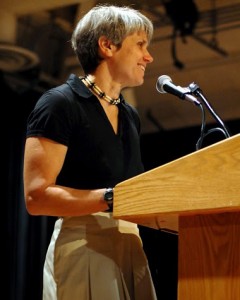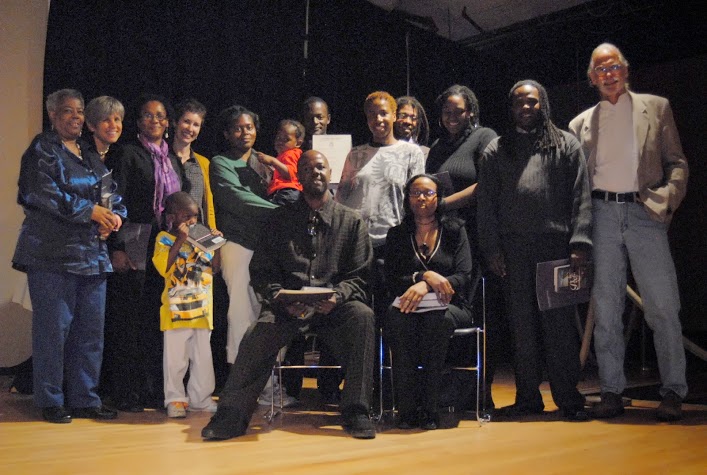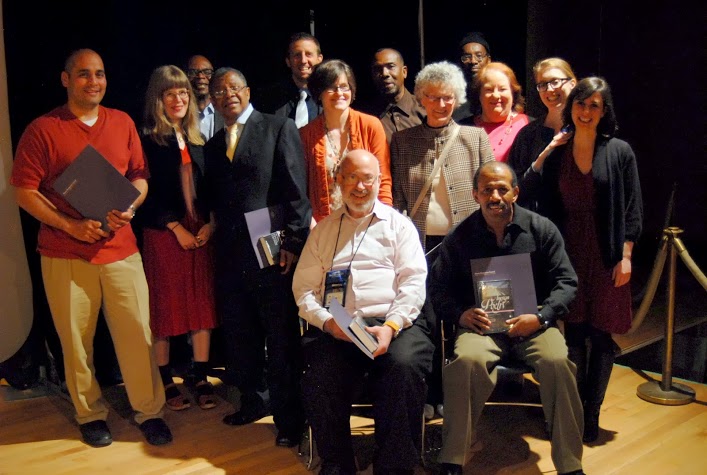Liberation, Not Enculturation: The Odyssey Project
Q&A with Amy Thomas Elder
The Odyssey Project, founded in 1995 by Earl Shorris in New York City, is a free college-level course in philosophy, literature, art history, and history for men and women living at or below 150 percent of the poverty level. The Odyssey Project’s mission was to give the underprivileged access to what Shorris calls “the moral life of downtown.” Since people from underserved communities have few opportunity to leave their neighborhoods, they have limited access, if any, to the lectures, films, museums, and other “high culture” products that downtown offers. For Shorris, the Odyssey Project was a cultural-corrective measure. In 2000, the Odyssey Project was established in Chicago to provide the same liberal arts instruction that Shorris envisioned.
But Chicago’s Odyssey Project, under the direction of Amy Thomas Elder, has diverged radically from Shorris’s “culturally corrective” vision – its goal is not enculturation, but liberation. “I want my students to be able to do whatever is meaningful and useful to them,” says Hilary Strang, an Odyssey Project instructor and the deputy director of MAPH. “A lot of people come to us who haven’t gone to college, but they don’t come to us because they want to go to college. They come to us because they want to develop as intellectuals.”
Colloquium talked with Amy Thomas Elder, executive director of The Odyssey Project, about the program, education, institutions, and the life of the mind.
Colloquium: Why teach philosophy or art? In other words, why insist upon these broad, expansive subjects instead of fashioning the Odyssey Project’s educational goals to “practical” skills tied more obviously to the workforce?
Amy Thomas Elder: To the extent to which the humanities are not stressed, we are creating a situation for ourselves that may become really untenable. Our society is held together now by an assumption of certain shared values that is left over from some other time, and we lack a real, deep, common identification with an ideal of humanity, individuality, liberty, truth, purpose. We desperately need more of an imagination about these things. The less we are able to talk about these critical issues, the more we are going to be reduced to cogs in a machine in a way that nobody wants to be.
Q: How does teaching children to formulate humanistic questions differ from the same project with adults?
ATE: The crude way I began to try to conceptualize that, when you are educating kids, even if you are trying to be radical and revolutionary, you are still forced to socialize the kids into a world that has certain structures and rules and opportunities and possibilities, and you’ve got to teach the kids what they have to know in order to be successful in that world. Which is, essentially, education in [Plato’s] Cave. You have to teach them how to recognize the patterns on the wall in order to cope with the realities of life.
Q: Does this prepare students for transitions top-tier colleges and universities? Does it have consequences for their lives outside of classrooms?
ATE: This was supposed to allow our students to feel less foreign when they got there [to a top tier university] and allow them to feel competent and be competent and not be overwhelmed by the culture shock by this very different type of institution. And that is all very well and good, but that still is about giving the people tools to succeed in a world, maybe better tools than learning to follow orders, and show up on time, but you are also teaching them that.
Q: How do you, as an educator, react to this kind of institutional instruction?
ATE: The whole time you’re The Man. That’s what one of my teachers said to me. She didn’t want to go into this, because she didn’t want to be The Man. She wanted to subvert The Man, and when you are teaching adults in the humanities, I think it’s all about helping people reflect on their lives and experiences in a way that liberates them from the cave.
Q: How do you get adults out of this mode of “education in a cave” into a different mode of engaging with the world?
ATE: From having to respond to expectations and the way the world is and to be able to be critical of that world. You want the kids to be critical of that world, of course, but in order for them to be critical, they have to have to buy into it a little bit. Maybe there is a way to get there that I haven’t figured out, without having to go through the socializing process. Maybe if you didn’t have to do it in a school, and give them grades, that you could really be outside of the institution, maybe take them camping.
Q: Do you think it is possible to help people to engage with intellectual issues typically reserved for the classroom without subjecting them to an academic restrictiveness that a university might impose on them?
ATE: But then there is a way that you can think about this as enculturating people into a sort of existing social-moral-political world, and I want people to have access to that social-moral-political world. I want them to be comfortable there, I want them to be critical of it, I want them to be able to do whatever it is they want to do. But the point is not to get to that world, the point is to get beyond that world. It was also the fact that we had to do it in a school. But it also had to do with having the conditions present in order to have good discussion. If there is going to be engagement and learning, you need to have everyone there, and they need to read what’s assigned to them. So part of it is that it is a class, that you have to give a grade, they have to do assignments, and you have to demonstrate that they learn something. But even beyond that, you have to secure the basic conditions for learning to occur.
Q: How does the communal feel of the Project’s educational environment change how your students engage the world around them?
ATE: Unlike institutional education where you are forced to socialize your students into a world that has certain structures and rules and opportunities so that your students can be successful in that world, teaching adults in the humanities is all about helping people reflect on their lives and experiences in a way that liberates them. It’s about challenging the norms, not reinforcing them.
Q: How does The Odyssey Project balance being an academic community with being an institution?
ATE: What’s beautiful about [the Odyssey Project] is that while it has become a bit of an institution, it is not an institution in the sense that other institutions like the University of Chicago are institutions. There is no protocol. At other academic institutions there is a sense that college is a place where you go to obtain credentials and get on with your life. At Odyssey, education is a communal endeavor. We want to make our community better. We want to make our classroom better, we want to make our families better, we want to make our lives better, together.
Q: How do your students bring the humanistic concepts you teach into their own lives? How does that assist in this process of liberation?
ATE: Well, for example, giving students the categories of ‘alienation’ or ‘unconscious motivation’ or ‘social constructivism’ are tremendously liberating. It allows students to get a sense of their situation that they have not been able to see. Students will say, ‘I thought I was the only one who thought this. I thought I was crazy.’ And the truth is that they are not alone.
Q: What separates this year at The Odyssey Project from past years?
ATE: It a lot of ways it’s pretty similar. We’ve had more students run into real difficulties or get jobs and have to leave the class. So, we’ve had more people have to leave the class at the beginning of the year, and we actually admitted a few people mid-year. Which has had an impact on the class dynamic, largely positive.
Q: How are students accepted into The Odyssey Project, and what goes into the process of choosing potential candidates?
ATE: I don’t so much look for what the students say but how they say it. It’s very, very difficult to tell from the applications. Often I will look at an application and the student will only have written one sentence for both of those questions. Like ‘I want a better life,’ or ‘in order to understand other people.’ But this is because they are used to filling out forms at the social security office. They aren’t used to answer questions like that. So, I pretty much interview everybody who applies. The real reason I do it is to hear their voice from their writing. A point of departure, I guess. I ask the same questions again at the end of the year, and I give them back what they wrote from the beginning, and have their aspirations changed. And at the end of the year, now why do you want to do this? Which is really interesting way to evaluate the course. I get some very interesting responses.
Q: Do your students’ original motivations change after completing the program?
ATE: Some of them will say, “my aspirations haven’t changed. I want to do this or this or this.” But usually, even if they say that, I sense a greater level of conviction about it. Direction and purpose. It is no longer because I want a better degree to get a better job. I want to keep learning, I want to stay engaged.
Q: As the students become more involved in their studies, how does their participation in courses change from beginning to end?
ATE: It becomes less confessional and more engaged with the material and with one another. I think students usually begin by talking to the teacher and then start to talk to each other as the course goes on. Although Odyssey Project students probably talk with one another more naturally and immediately than students in other kinds of classes.
Q: What kind of “work” are your students required to do? What are the goals of these assignments?
ATE: Pretty much just shortish essays. I teach the writing component. I am really just trying to help students what a claim is, what kind of claims you can make to texts and how making a claim about a text can be a deeply personal thing. People have this conception that a claim is something that they feel or some dry academic thing. And trying to connect a passionate response to something with the ability to make an argument about it, these are things we ought to be passionate about. We have to get beyond “I am entitled to my opinion” to an argument on why this text is important. And not just that it is important to me, but that it is important to people and I am going to show you why.
Q: How are your classroom discussions organized? What do you want your discussion to do?
ATE: We talk a lot about, in the philosophy class at the beginning of the year, how education is a moral endeavor. That this is about becoming conscious, about reflecting on what is that is most important to know, it is about thinking about what makes for a good life and doing it together. From the beginning we are thinking about these questions, and I don’t think that community colleges address these questions in the same way. Because what they are studying is not sort of at the heart of who you are, just by virtue of being a human being.
Q: How do students who go on to further education find their transitions to other institutions of higher education?
ATE: My students frequently come back and say “I am doing fine in community college and it just wasn’t as challenging.” And I don’t think that is just about the material, and although partly it is, because the history class at Harold Washington is using a textbook which is less challenging than having to read, say, the Dread Scott Decision, which is really difficult.
Q: How have some of your students’ lives changed after The Odyssey Project?
ATE: One woman who had not obtained a GED when she took the class, a couple years later she still hadn’t taken a GED test. And I asked, “What’s the matter? You are clearly able to do this.” A couple years later she finally got the GED and applied to a city college. She said, “My whole internal life changed, but it took a while for my external life to catch up.” She had a lot of kids, her oldest one actually went to jail during the middle of class. Her younger kids were failing in school. She thought the school was terrible. She actually moved her family from the west side to the south side so that her children could go to a different school and she went to school and met the principle and talked regularly. The principle actually now asks her for advice.
Q: Finally, one fortune-telling question. In your opinion, what does the future of The Odyssey Project look like?
ATE: Well, I will tell you what I’d like to see happen. I wish we could go farther. I wish we could keep students for 4 years. I want them to get even farther along.
photos by Lindsay Atnip





